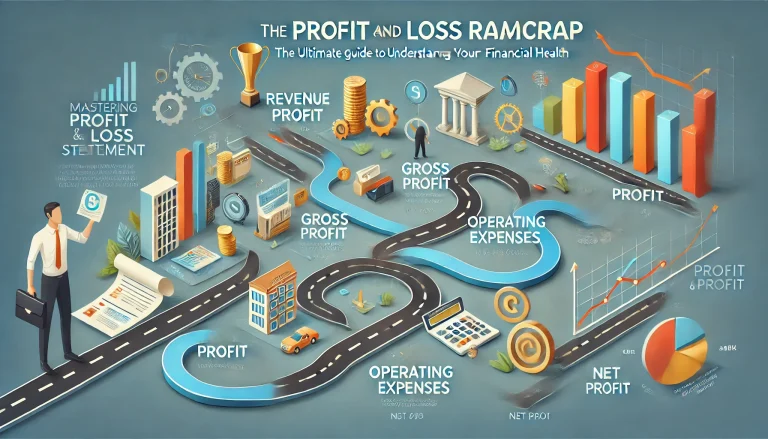Creating an annual budget for your business is not just a financial exercise; it’s a strategic roadmap that guides your company towards its goals. In this comprehensive guide, “A Step-by-Step Guide to Creating an Annual Budget for Your Business,” we will demystify the budgeting process and provide you with the tools to master your company’s finances. This isn’t just about numbers—it’s about making informed decisions that propel your business forward.
Disclosure: If you click on my affiliate/advertiser’s links, I am going to receive a tiny commission. AND… Most of the time, you will receive an offer of some kind. It’ s a Win/Win!
Your business’s financial health is the backbone of its success. Without a well-planned budget, navigating the fiscal year can be like sailing without a map. This guide is designed to elevate your financial acumen, offering insights that will enhance your budgeting skills and, ultimately, your business leadership.
Imagine having a clear, actionable plan that details every aspect of your business’s financial future. With an annual budget, you can forecast revenue, control expenses, and allocate resources efficiently. This step-by-step guide will walk you through the process, from understanding the basics to implementing advanced budgeting techniques.
Whether you’re a seasoned entrepreneur or a budding business owner, mastering the art of budgeting is crucial. This guide will help you avoid common pitfalls, optimise your spending, and ensure that every pound is working towards your strategic goals. Prepare to transform your business operations with a budget that not only supports growth but also fosters stability.
Stay with us as we look into the intricacies of creating an annual business budget. By the end of this article, you’ll be equipped with practical knowledge and actionable steps to create a budget that drives success. Let’s begin this journey towards financial mastery and business excellence.
Topics for consideration:
1. **Understanding the Importance of an Annual Budget**
– Explore why an annual budget is crucial for business success and how it can improve decision-making and financial stability.
2. **Setting Clear Financial Goals**
– Learn how to define specific, measurable, and realistic financial goals that align with your business strategy.
3. **Gathering Financial Data**
– Discover the key financial data you need to collect and analyse to create an accurate budget, including past financial statements and market trends.
– Understand different methods to forecast your business revenue accurately, considering market conditions and historical performance.
5. **Identifying and Categorising Expenses**
– Learn how to list all business expenses, categorise them appropriately, and identify fixed and variable costs.
6. **Creating Budget Projections**
– Get step-by-step instructions on how to create detailed budget projections, including cash flow forecasts and profit margins.
7. **Allocating Resources Effectively**
– Explore strategies for allocating resources in a way that maximises efficiency and supports your business goals.
8. **Monitoring and Adjusting Your Budget**
– Learn the importance of regular budget reviews and how to adjust your budget to reflect changes in your business environment.
9. **Using Budgeting Tools and Software**
– Discover the best budgeting tools and software that can streamline the budgeting process and enhance accuracy.
10. **Common Budgeting Mistakes to Avoid**
– Identify common pitfalls in the budgeting process and learn how to avoid them to ensure your budget remains effective and realistic.
11. **Summary and Conclusion: Mastering Your Business Finances for Success**
1. Understanding the Importance of an Annual Budget
An annual budget is not just a financial document; it’s a strategic tool that can make or break your business. It outlines your financial goals, helps you forecast revenue and expenses, and guides your decision-making process. Without a clear budget, your business risks overspending, underestimating expenses, and missing out on growth opportunities. By creating an annual business budget, you ensure that every financial decision is made with your overall strategy in mind.
A well-constructed budget provides a roadmap for the year ahead, allowing you to allocate resources effectively and avoid unnecessary expenses. It also helps you anticipate financial challenges and plan accordingly, ensuring that your business remains resilient even in tough times. For example, if you foresee a dip in revenue during a certain period, you can adjust your spending to maintain financial stability.
Ignoring the importance of budgeting can lead to financial mismanagement, ultimately jeopardising your business’s survival. By understanding and implementing a thorough budget, you lay the groundwork for a successful and profitable year.
2. Setting Clear Financial Goals
Setting clear financial goals is a critical step in creating an annual budget for your business. These goals should be specific, measurable, achievable, relevant, and time-bound (SMART). By defining what you want to achieve, you can create a budget that aligns with your business objectives and tracks your progress over time.
For instance, you might set a goal to increase your revenue by 10% over the next year or reduce operational costs by 5%. Having these clear targets helps you focus your efforts and allocate resources effectively. It also allows you to measure your success and make adjustments as needed to stay on track.
Without clear financial goals, your budget lacks direction, making it difficult to prioritise spending and investments. Setting and adhering to these goals ensures that your business remains focused and driven towards growth and profitability.
3. Gathering Financial Data
Gathering accurate financial data is the foundation of any effective budget. This data includes past financial statements, market trends, and economic forecasts. By analysing this information, you can make informed decisions about your future financial planning and budgeting.
For example, reviewing your previous year’s income and expenses can help you identify patterns and trends. You might notice that certain times of the year are more profitable, allowing you to plan accordingly. Additionally, understanding market trends can help you anticipate changes in demand and adjust your budget to take advantage of new opportunities or mitigate risks.
Failing to gather and analyse accurate financial data can lead to unrealistic budget projections and poor financial decisions. Ensuring that you have a solid understanding of your financial history and market conditions sets the stage for a successful budget.
4. Estimating Revenue
Estimating revenue accurately is essential for creating a realistic and effective budget. Revenue forecasts should be based on historical data, market conditions, and your business’s growth plans. This ensures that your budget reflects your expected income and helps you plan your expenses accordingly.
For example, if your business has consistently grown by 5% annually, you can use this trend to forecast future revenue. Additionally, considering factors such as new product launches, marketing campaigns, and economic conditions can help refine your estimates.
Overestimating revenue can lead to overspending and financial strain, while underestimating it can result in missed opportunities for growth. By making informed and realistic revenue estimates, you create a solid foundation for your annual budget.
5. Identifying and Categorising Expenses
Identifying and categorising your expenses is a crucial part of the budgeting process. This involves listing all your business expenses and categorising them into fixed and variable costs. Fixed costs remain constant regardless of your business activity, such as rent and salaries, while variable costs fluctuate with production levels, like raw materials and utilities.
For example, if you run a manufacturing business, your fixed costs might include factory rent and equipment maintenance, while your variable costs could be raw materials and shipping fees. By categorising expenses, you gain a clearer understanding of where your money goes and can identify areas for cost savings.
Failing to accurately identify and categorise expenses can lead to budget imbalances and financial difficulties. By thoroughly understanding your expenses, you can create a more accurate and manageable budget.
6. Creating Budget Projections
Creating budget projections involves forecasting your income, expenses, and cash flow for the upcoming year. This step-by-step process helps you understand your financial position and plan for the future. By projecting your finances, you can anticipate potential shortfalls and make adjustments to avoid financial strain.
For example, you might project that your revenue will increase by 10% based on historical data and market trends. Simultaneously, you forecast your expenses, ensuring that your spending aligns with your projected income. This process helps you plan for necessary investments, such as marketing campaigns or new hires, while maintaining financial stability.
Without accurate budget projections, your business risks running into cash flow problems and financial uncertainty. By creating detailed and realistic projections, you ensure that your business remains financially healthy throughout the year.
7. Allocating Resources Effectively
Effective resource allocation is key to maximising efficiency and achieving your business goals. This involves distributing your financial resources in a way that supports your strategic objectives and ensures optimal performance. By prioritising spending on high-impact areas, you can drive growth and improve profitability.
For example, if your goal is to expand your market reach, you might allocate more resources to marketing and sales efforts. Alternatively, if you’re focusing on improving operational efficiency, you might invest in new technologies or training programs. Effective resource allocation requires a thorough understanding of your business priorities and a clear plan for achieving them.
Poor resource allocation can lead to wasted funds and missed opportunities. By carefully planning and prioritising your spending, you ensure that every pound is used effectively to support your business’s success.
8. Monitoring and Adjusting Your Budget
Monitoring and adjusting your budget regularly is crucial for maintaining financial control and responding to changes in your business environment. This involves reviewing your budget performance, comparing actual results to projections, and making necessary adjustments to stay on track.
For example, if you notice that your expenses are higher than projected, you might need to cut costs or reallocate resources. Similarly, if your revenue exceeds expectations, you can invest in new opportunities for growth. Regular budget reviews help you stay agile and responsive to financial challenges and opportunities.
Ignoring the need for regular budget adjustments can lead to financial instability and missed growth opportunities. By continuously monitoring and adjusting your budget, you ensure that your business remains on a path to success.
9. Using Budgeting Tools and Software
Utilising budgeting tools and software can streamline the budgeting process and enhance accuracy. These tools offer features such as automated calculations, real-time data analysis, and reporting capabilities, making it easier to create and manage your budget.
For example, tools like QuickBooks or Xero can help you track income and expenses, generate financial reports, and forecast future performance. These tools not only save time but also reduce the risk of human error, ensuring that your budget is as accurate and effective as possible.
Failing to leverage budgeting tools can result in inefficiencies and inaccuracies. By incorporating these tools into your budgeting process, you enhance your financial management capabilities and improve your business’s overall performance.
10. Common Budgeting Mistakes to Avoid
Avoiding common budgeting mistakes is essential for creating an effective and realistic budget. Some of the most frequent pitfalls include underestimating expenses, overestimating revenue, and failing to review and adjust the budget regularly.
For example, businesses often underestimate variable costs or overlook small but recurring expenses, leading to budget shortfalls. Overestimating revenue can create unrealistic expectations and financial strain. Additionally, failing to review and adjust the budget in response to changes can result in missed opportunities and financial instability.
By being aware of these common mistakes and taking steps to avoid them, you ensure that your budget remains accurate, realistic, and effective. This proactive approach helps you maintain financial control and supports your business’s long-term success.
+++++++++++++++++++++++++++++++++++++++++++++++++++++++++++++++++++++++++++++++++++++++
Tools and resources
- 1. QuickBooks Online
- – Description: QuickBooks Online is a robust accounting software that helps businesses manage their finances, including budgeting, invoicing, and expense tracking. It’s ideal for small to medium-sized businesses.
- 2. FreshBooks
- – Description: FreshBooks offers easy-to-use accounting software designed for small business owners. It features automated invoicing, expense tracking, and budgeting tools.
- 3. Xero
- – Description: Xero is an online accounting software that provides comprehensive tools for financial management, including budgeting, payroll, and financial reporting.
- 4. Budgeting Templates from Etsy
- – Description: Various sellers on Etsy offer customizable budgeting templates that can be used with spreadsheet software like Excel or Google Sheets. These templates can simplify the budgeting process for business owners.
- 5. PlanGuru
- – Description: PlanGuru offers advanced budgeting, forecasting, and performance review tools for small to medium-sized businesses. It integrates with accounting software and provides detailed financial planning capabilities.
- 6. Wave Financial
- – Description: Wave offers free accounting software with additional paid services for payroll and payments. It’s particularly suitable for small businesses and freelancers.
- 7. Books on Business Budgeting (e.g., Amazon)
- – Description: Find relevant books on business budgeting, financial planning, and management available on Amazon. Books such as “Profit First” by Mike Michalowicz and “The Lean Startup” by Eric Ries can be valuable resources.
+++++++++++++++++++++++++++++++++++++++++++++++++++++++++++++++++++++++++++++++++++++++
Summary and Conclusion: Mastering Your Business Finances for Success
Creating an annual business budget is a fundamental step in mastering your company’s financial health and ensuring its long-term success. By understanding the importance of an annual budget, you equip yourself with a powerful tool that guides your financial decisions, supports strategic planning, and fosters business stability. This comprehensive approach to budgeting allows you to navigate the complexities of business finance with confidence and clarity.
Setting clear financial goals is essential for any successful budget. By defining specific, measurable, and achievable objectives, you create a roadmap that aligns your financial planning with your overall business strategy. These goals help you focus your efforts, allocate resources effectively, and measure your progress, ensuring that your business stays on track to achieve its desired outcomes.
Gathering accurate financial data and estimating revenue accurately are crucial steps in the budgeting process. By analysing past financial statements and market trends, you can make informed decisions about your future financial planning. Accurate revenue estimates ensure that your budget reflects realistic expectations, helping you plan your expenses and investments wisely.
Identifying and categorising expenses provides a clear understanding of where your money goes, allowing you to control costs and improve efficiency. By creating detailed budget projections, you can anticipate potential financial challenges and make proactive adjustments to avoid financial strain. Effective resource allocation ensures that every pound is used efficiently to support your business goals.
Regularly monitoring and adjusting your budget is vital for maintaining financial control and responding to changes in your business environment. Utilising budgeting tools and software can streamline this process, enhancing accuracy and efficiency. By avoiding common budgeting mistakes, you ensure that your budget remains realistic and effective, supporting your business’s long-term success.
Now is the time to take action. Start by reviewing your current financial practices and setting clear goals for the upcoming year. Gather the necessary financial data, and begin creating a detailed budget that aligns with your business objectives. Use the insights and strategies from this guide to refine your budgeting process and ensure that your business is well-prepared for the future.
Stay engaged with krislai.com for more insights and tips on elevating your business acumen and improving your leadership skills. Our blog is dedicated to helping you navigate the complexities of business finance and strategy, providing you with the tools and knowledge needed to thrive in today’s competitive environment. Whether you’re a seasoned entrepreneur or just starting, our resources are designed to support your journey to success.
Remember, a well-crafted budget is not just a financial document; it’s a strategic roadmap that guides your business towards its goals. By mastering the art of budgeting, you empower yourself to make informed decisions, optimise resources, and achieve sustainable growth. Stay committed to continuous learning and improvement, and let krislai.com be your trusted partner in this journey.
Return to our blog regularly to stay inspired and informed. Together, we can elevate your business acumen, enhance your leadership skills, and ensure that your business not only survives but thrives in the ever-evolving marketplace.
You can easily review some of our recent articles here:
- How Live Shopping Can Skyrocket Your Small Business Sales: The Ultimate Guide to Getting Started
- Turn AI Anxiety into Competitive Advantage: How to Future-Proof Your Workforce for the AI Revolution
- Unlock Profit: Calculate Customer Lifetime Value & Maximize Growth
- Creating a Customer Persona: A Step-by-Step Guide On How To Do It
- Unleashing the Power of Digital Signage: The Best Software to Transform Your Business







